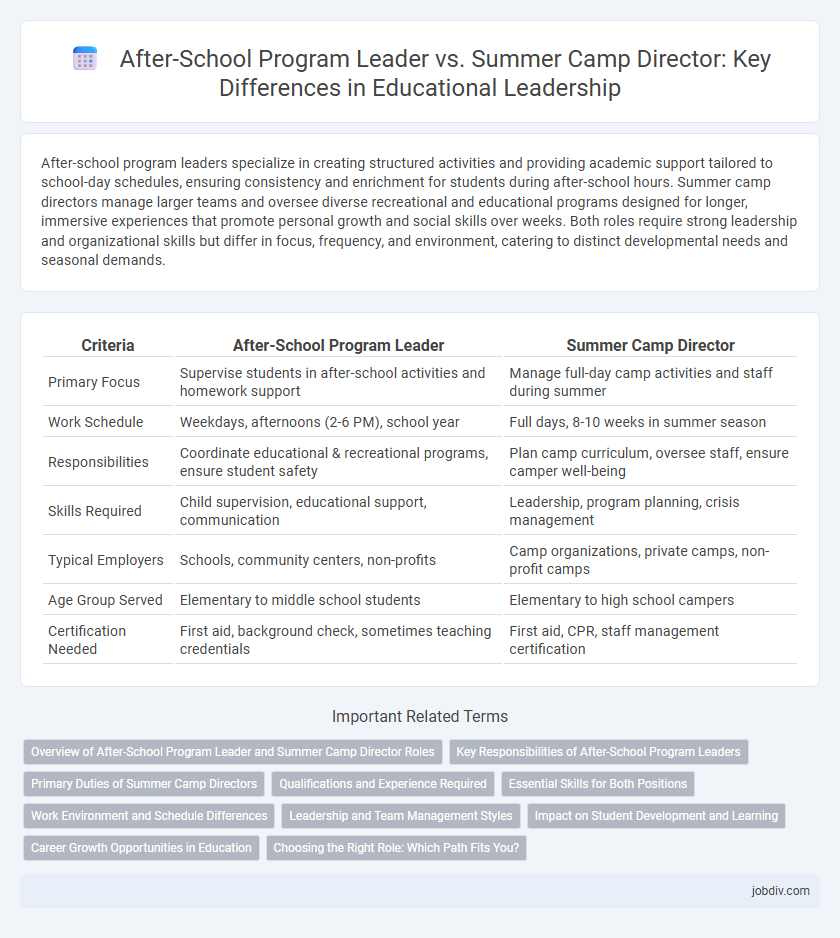After-school program leaders specialize in creating structured activities and providing academic support tailored to school-day schedules, ensuring consistency and enrichment for students during after-school hours. Summer camp directors manage larger teams and oversee diverse recreational and educational programs designed for longer, immersive experiences that promote personal growth and social skills over weeks. Both roles require strong leadership and organizational skills but differ in focus, frequency, and environment, catering to distinct developmental needs and seasonal demands.
Table of Comparison
| Criteria | After-School Program Leader | Summer Camp Director |
|---|---|---|
| Primary Focus | Supervise students in after-school activities and homework support | Manage full-day camp activities and staff during summer |
| Work Schedule | Weekdays, afternoons (2-6 PM), school year | Full days, 8-10 weeks in summer season |
| Responsibilities | Coordinate educational & recreational programs, ensure student safety | Plan camp curriculum, oversee staff, ensure camper well-being |
| Skills Required | Child supervision, educational support, communication | Leadership, program planning, crisis management |
| Typical Employers | Schools, community centers, non-profits | Camp organizations, private camps, non-profit camps |
| Age Group Served | Elementary to middle school students | Elementary to high school campers |
| Certification Needed | First aid, background check, sometimes teaching credentials | First aid, CPR, staff management certification |
Overview of After-School Program Leader and Summer Camp Director Roles
After-School Program Leaders oversee daily academic support and enrichment activities for students aged 5 to 14, ensuring a safe and engaging environment while coordinating with teachers and parents. Summer Camp Directors manage large groups of campers, typically aged 7 to 16, focusing on recreational, social, and leadership development through organized games, workshops, and outdoor experiences. Both roles require strong leadership, communication skills, and experience in child development, but differ in operational scope and seasonal focus.
Key Responsibilities of After-School Program Leaders
After-School Program Leaders manage daily student activities, oversee homework assistance, and ensure a safe and engaging environment for children aged 5 to 12. They coordinate with teachers and parents to support educational goals and monitor student behavior and progress. These leaders also develop lesson plans and organize enrichment programs tailored to diverse student needs.
Primary Duties of Summer Camp Directors
Summer camp directors oversee the comprehensive planning and execution of camp activities, ensuring safety protocols and staff coordination are maintained throughout the session. They manage budgets, recruit and train counselors, and develop engaging programs that promote camper development and enjoyment. Unlike after-school program leaders, whose focus lies primarily in daily educational support and enrichment, camp directors handle seasonal, large-scale operational responsibilities.
Qualifications and Experience Required
After-School Program Leaders typically require a Bachelor's degree in Education, Child Development, or a related field, along with experience in classroom management and working with diverse age groups of children. Summer Camp Directors often need more extensive experience in program planning, staff supervision, and safety regulations, frequently holding certifications in first aid, CPR, and sometimes outdoor education or recreational therapy. Both roles demand strong leadership, communication skills, and a background in youth development, but the Summer Camp Director position generally involves higher responsibility and specialized training.
Essential Skills for Both Positions
Effective communication and leadership skills are crucial for both after-school program leaders and summer camp directors to manage diverse groups of children and coordinate activities. Strong organizational abilities ensure smooth operation of schedules, resource allocation, and emergency preparedness in both roles. Emotional intelligence helps in understanding and responding to the social and developmental needs of youth, fostering a safe and inclusive environment.
Work Environment and Schedule Differences
After-school program leaders typically work in school settings with schedules aligned to the academic year, primarily during afternoons and early evenings on weekdays. Summer camp directors oversee camp operations in outdoor or recreational environments, often working extended hours throughout the summer months, including weekends. The contrasting work environments influence job structure, with after-school leaders managing structured educational activities, while camp directors handle diverse, seasonal programming.
Leadership and Team Management Styles
After-School Program Leaders emphasize consistent engagement and collaborative leadership, fostering a nurturing environment tailored to students' daily academic and social needs. Summer Camp Directors prioritize dynamic team management and adaptability, leading diverse groups through fast-paced activities and seasonal challenges. Both roles require strong communication skills and the ability to motivate staff, but the focus shifts from routine support to intensive, event-driven leadership.
Impact on Student Development and Learning
After-School Program Leaders provide structured academic support and enrichment activities that enhance students' critical thinking and social skills during the school year, fostering consistent development. Summer Camp Directors create immersive, experiential learning environments that promote independence, creativity, and leadership through diverse recreational and educational activities. Both roles significantly impact student growth, with after-school leaders emphasizing continuous learning and summer directors enhancing personal and social capabilities in a more flexible setting.
Career Growth Opportunities in Education
After-School Program Leaders develop skills in curriculum planning and youth mentorship, providing a strong foundation for advancing into administrative or specialized educational roles. Summer Camp Directors gain expertise in large-scale program management, staff supervision, and safety compliance, which opens pathways to leadership positions within recreational education and event coordination sectors. Both roles offer valuable experience for career growth, with a Summer Camp Director often positioned for higher-level management due to broader organizational responsibilities.
Choosing the Right Role: Which Path Fits You?
Choosing between an After-School Program Leader and a Summer Camp Director depends on your passion for year-round engagement versus seasonal, intensive leadership. After-School Program Leaders focus on consistent student development through structured activities during the academic year, emphasizing mentorship and academic support. Conversely, Summer Camp Directors manage large teams and coordinate diverse recreational programs, requiring strong organizational skills and adaptability to fast-paced environments.
After-School Program Leader vs Summer Camp Director Infographic

 jobdiv.com
jobdiv.com